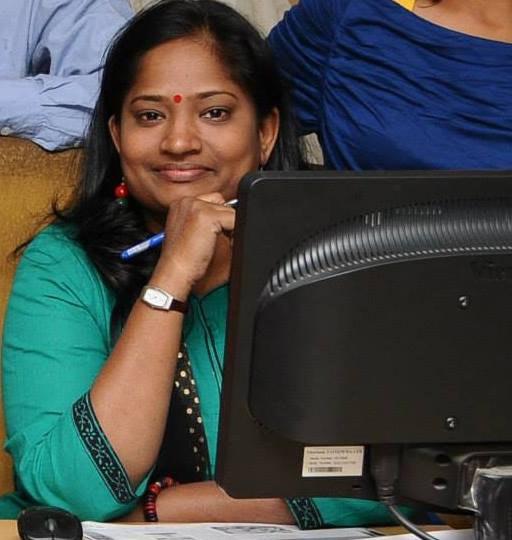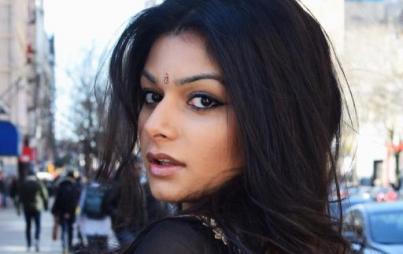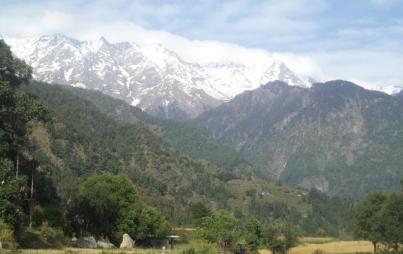
In case you missed it, there's a new bucket challenge in town—and it's gaining thousands of followers while making a tangible difference around the world.
Using the American Ice Bucket Challenge as inspiration, Manju Latha Kalanidhi of Hyderabad, India decided to launch a charity that resonated with the Indian people. Her initiative, the Rice Bucket Challenge, is based on a simple but powerful concept: Pick up a bucket of rice and give it to someone in need—and no, they do not need to dump the rice over their head.
Manju gave her first bucket of rice for the RBC in late August, challenging her friends and family to do the same through Facebook. Little did she know that it would soon go viral, garnering interest from major news outlets, philanthropists and countless citizens. Thousands of people have liked, shared and donated in India, and now it's going global, thanks in part to a partnership with Ravishly to get the word out.
We took the Rice Bucket Challenge last week; this week we caught up with Manju, who graciously offered to take time out of her busy schedule to answer some questions for us. Here's what she had to say about the RBC, life in India—and how social media stardom has changed her life.
Are you originally from Hyderabad? What was it like for you growing up?
I was born and brought up in Warangal, a sleepy town about 90 miles from Hyderabad, the capital of the south Indian state Telangana. I belong to a regular middle-class family—by that I mean we had enough money for healthy food, a clean home and for education, but we did not have luxuries such as branded goods, electronics, bikes or cars. My father Narasimha Rao Kalanidhi worked in the Indian Railways. Life was pretty hassle-free and stress-free. I am the youngest of three—I have a brother and a sister. I was brought up on good Indian values of caring, sharing, reusing, recycling and being conscious of what I was doing. I moved to Hyderabad in 1997 when I turned 21 and started working as a journalist in the English mainstream print media. I have been living in Hyderabad for 17 years now.
You’re the senior editor with Oryza, a global rice news and trade website. Has your daily life changed since the Rice Bucket Challenge took off?
I joined Oryza.com in June 2014. Life took a complete U-turn—perhaps a point of no return—on that bright Sunday morning of Aug 24 when my day began with a host of phone calls from my friends who called to congratulate me after seeing a small write-up in The Hindu newspaper about my rice bucket challenge. When I logged onto my Facebook page, I saw over 500 likes and 200 shares. Then I discovered someone had already opened a Facebook page, and things started moving at a rapid pace. The media started getting in touch with me. By mid-morning, my husband Vijey Devuni, who is also an integral part of the campaign, and I found ourselves coordinating all the action around the RBC.
By afternoon, I was recording an interview for one TV channel, yelling out my message about Rice Bucket Challenge to Australia’s RBC drive (no idea how they got through to me), shooting off email answers to websites, talking to Reuters on the phone, and accepting congratulatory messages. Life simply moved to another paradigm altogether.
Where did the RBC idea come from?
Definitely the Ice Bucket Challenge! While I do respect the challenge, and the reason why people were pouring cold water on themselves, I was aghast when a lot of Indian friends and celebs took it up just for fun, without caring about the cause (ALS). I am sure it is a cause very close to Americans, but in India, we have more basic problems and disease. I am not sure even many educated and informed Indians are aware of ALS. So I felt that if the idea is to take up a cause, why not do something in your community? Why not do something tangible and practical? A bit of cynicism for the IBC, some innovation, and a bit of cockiness that I could tweak it to the local sensibilities came together to make RBC. Of course, as part of Oryza’s editorial work, I am day in and day out researching about rice, exports, imports, research, shortage, hunger and the like. India itself is a rice-eating, rice-loving country. So the ice-rice connect came in effortlessly. See, it helps to work for a rice website!
Who was the first person you took a bucket of rice to?
Mr. Sathibabu. He is a 55-year-old man who sells homemade breakfast to the people in my area. He is a hardworking person and should he ever fall sick, I doubt if anyone would come forward to help him out that day. In India, there are millions of people who come under what's the called the ‘unorganized sector.' By that I mean they have no health insurance, no job guarantee, no pension. The day they stop working, they may have to go without a meal.
You have caused quite a stir in India with this challenge. Did you expect your idea to blow up like this when you gave your first bucket of rice away?
Nope. Never. Had I known it had so much potential, I would have circulated a better picture of my first donation. I was expecting 80 likes, three shares and perhaps my nearest family to take up the challenge and that by that weekend, I would have gone back to my regular life!

What's been the highlight of this experience?
A genuine thought/intention can touch a million people.
Social media is a powerful tool and can be a great tool to bring out social change.
That without spending a penny on advertising or promotions, by the sheer strength of a good campaign, one can reach out to millions, across the globe. As on September 8, the campaign has spread to U.S., Asia and Africa, and to countries like Vietnam, Bahrain and The Philippines.
What challenges have you faced?
Considering the kind of success it has tasted, the challenges were really insignificant. My broadband connection at home (through which I use the Internet on my laptop) conked off on that fateful Sunday and it was the biggest challenge, as I had to keep updating pictures people were sending, and keep track of the page. My plan B of a slow Internet dial-up was failing me. My mobile phones needed constant recharging to take all of the calls. I could not do a Skype interview for a prestigious international news channel because my Internet connection was slow. My mailbox and phone message box were overfilled.
Both my husband and I were overworked, overwhelmed, drained out, but still on top of the world. My nine-year-old daughter Vanshika felt like she suddenly had a sibling and I was ignoring her. As a single child, she never had any dearth of attention and now she had to fend for herself while Vijeye and I were tending to the newborn—the Rice Bucket Challenge!
I think handling the media, giving interviews, ensuring that I left no opportunity to talk about the cause, doing live shows for television channels, staying up late in the night to finish my work for Oryza and at the same time keep the campaign alive . . . That was a bit difficult. After one week, I suddenly felt the need to have a personal assistant, a litigant manager (too many spin-offs of the page, too many fake FB accounts masquerading as RBC). I also wished I had a small five-member office to manage my appointments, update the website and the like. But all in all, the media and people extended their hearty support and I must say it was a great experience.
Why do you think the RBC has resonated with so many people?
I think it was a simple concept. I was not into collecting money or rice to give it to a particular cause or charity. It was a customizable concept. You can donate whatever you want (technically a bucket of rice, but not many can afford to give so much) to whoever you think is deserving. Also in this case, there was something tangible and useful that was exchanging hands. In India, rice donation is considered to be among the best of donations, so I guess that appeal also worked. I think a picture speaks a thousand words and seeing one in your family or friend’s circle is bound to inspire/provoke you to do it. The ease of social media and the way a small act could fetch you appreciation and likes from all corners of the world also was an added incentive.
Do you know how many people have taken the challenge?
I am presuming at least 20,000 kilograms of rice must have been distributed now. Several corporations have joined to do it in bulk—500 kilograms at a time. College campuses, firms, media houses and technology firms have joined in big numbers. I think the number of photographs and videos on the page speak to the numbers. I have no mechanism to count, but I am just using common sense here.

We are working to take the RBC global by encouraging people to donate to their nearest food bank. Why did you want to take this effort global?
I think rice donation has a universal appeal, not restricted to India alone. That could be the reason why within the first three or four days, I received calls, emails and messages asking me how they can donate from Turkey, California, Sydney, Cambodia and beyond. It is a great idea to donate to local food banks. This is also a sustainable campaign as hunger is not a seasonal fad. Hunger is all-pervading and the satisfaction of feeding a hungry stomach is bound to make any human being happy.
What's up next for the RBC?
To ensure the movement reaches more campuses, youth and corporations, as that would bring in more people (in the thousands at a time).
To ensure that the likes, comments and shares translate into actual rice donation.
To take it offline too. In India there are millions of senior citizens who don’t have an online presence but would love to take part in this. So spreading the word for those offline will take the campaign places.
I recently won the Karamveer Chakra award instituted by the United Nations and iCongo (international confederation of NGOs) and I hope this global award and the fellowship I will be getting as part of the award, as well as my association with Ravishly.com, can help me take this campaign across the globe.






